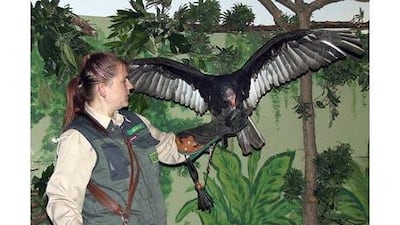BERLIN // German police are testing the use of vultures to seek out human corpses in a unique project aimed at dramatically speeding up criminal investigations. A bird expert at a wildlife park in northern Germany is training Sherlock, a five-year old turkey vulture, to locate fabric containing the scent of dead people. The scheme was commissioned by the Lower Saxony police force after a senior officer, Rainer Herrmann, watched a BBC wildlife documentary about the extraordinary sense of smell of turkey vultures, which are indigenous to the Americas. The programme showed the birds finding hidden meat with ease.
"This project is unprecedented and the phones have been ringing off the hook with investigators all around Germany expressing an interest," Sherlock's trainer, German Alonso, said. "But we've had to put the brakes on and tell people we're not that far yet." Trained sniffer dogs such as bloodhounds are highly effective in tracking and remembering scents, but they need to take frequent breaks and can only scour 100 square metres per day, or even less if the terrain is difficult.
"Vultures can fly over many square kilometres. They could make police work much more efficient," said Mr Herrmann, an expert on forensic science and technology at the Lower Saxony criminal police force. It would take the birds just a few hours to cover areas that would take dogs days. The birds are capable of detecting scents from the air, even through forest canopies. Under the plan, tracking devices would be attached to the vultures so that they could be traced by police.
One potential disadvantage is that the vultures are likely to start picking at corpses they find, Mr Alonso admitted. "That will happen and you can't stop it but they won't remove the entire corpse, they can't eat that much. And if they take a nibble, what the hell, the victim will be beyond help anyway. Besides, the transmitters will enable police to get to the scene quickly." So far, Sherlock is on his own and has been practising in a confined area of around 40 square metres in the Walsrode Bird Park, about 80 kilometres north of the city of Hanover.
At present, he does not search from the air, and instead hops across the ground. Every time he locates the hidden cloth, he gets a reward. It would take at least three vultures to conduct an airborne hunt for victims because the birds are naturally timid and need companions to venture into the skies. Mr Alonso, said: "Sherlock will need fellow scavengers to look for corpses, he won't do so alone. You need a group because vultures are cowardly and very afraid as lone animals.
"They need the motivation of their partners. One is always slightly braver than the others, and he then tends to play the leader. He takes off, the others follow and they circle until one of them smells something and descends. The others spot that and join him." One problem is that it is unclear whether vultures can distinguish between animal cadavers and human corpses. The bird park is using fabric provided by the mortuary of a medical university to train Sherlock to locate humans.
"But if they see a dead boar or deer they'll descend on that too, which means there will be many false alarms during searches when the birds are operational," Mr Alonso said. Perhaps the biggest obstacle is the shortage of available vultures in Europe, especially ones as tame and easy to handle as Sherlock, which came to Walsrode from Prague Zoo. Mr Alonso said Walsrode will be acquiring several new vultures this year to expand the project, but it will take several years for the birds to begin their grisly task in earnest.
"With all his training Sherlock could be their leader, even though he's a bit of a coward," he said. @Email:foreign.desk@thenational.ae

